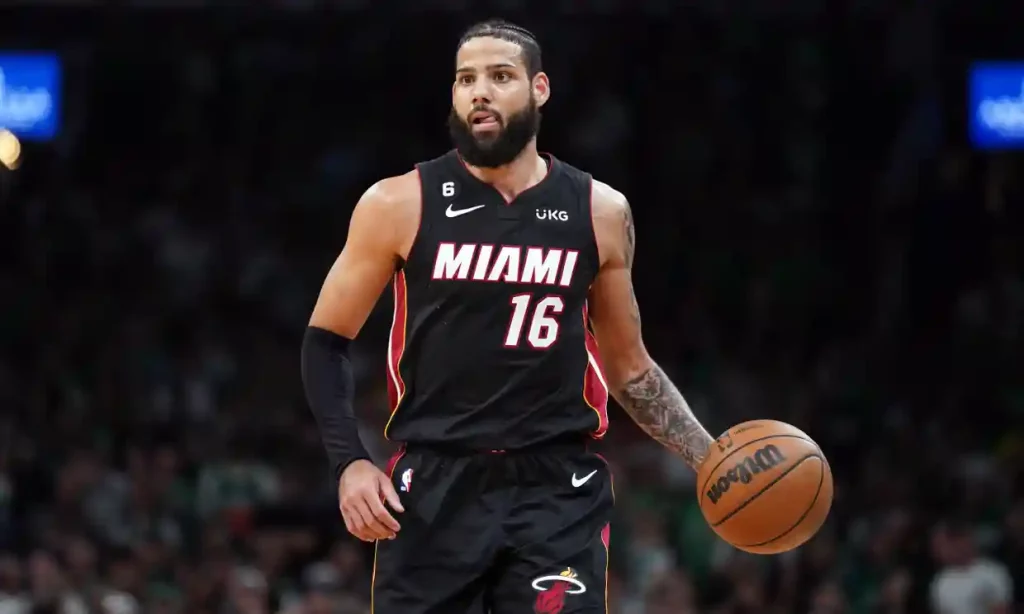Miami Heat’s Game 7 triumph over the Boston Celtics in the Eastern Conference finals revealed a key pattern in NBA playoffs: the better-prepared team tends to have the upper hand.
Despite losing their previous three games, the Miami Heat regrouped and delivered a resounding 103-84 victory on the road.
Unfortunately for the Celtics, their valiant fight to stay alive was undermined by the return of the same detrimental habits that had pushed them to the brink of elimination.
Celtics guard Malcolm Brogdon aptly described the challenge they faced, stating, “The hole we put ourselves in, it’s hard. No one’s climbed out of that hole. It was the same tonight. We couldn’t climb out of the hole we created.”
Before delving into the Celtics’ shortcomings, it is important to acknowledge Caleb Martin of the Miami Heat. Despite narrowly missing out on the Eastern Conference finals MVP award, Martin’s contributions were commendable.
While Jimmy Butler rightfully earned recognition for his overall postseason performance, his struggles during the middle of the series played a role in the Celtics’ ability to mount a comeback.
Conversely, Martin consistently stepped up for the Heat, delivering crucial baskets whenever needed. In Game 7, he scored 26 points on 16 shots, displaying remarkable efficiency without a single free throw, while also grabbing 10 rebounds.
By the end of the series, Martin had accumulated a record-breaking 132 points, setting a new benchmark for an undrafted player in a Conference final.
Ultimately, Martin’s impact and the resiliency of the Miami Heat, led by “Playoff Jimmy” Butler, propelled them to become only the second No. 8 seed in NBA history to reach the NBA finals.
The previous team to achieve this feat was the 1999 New York Knicks, although they fell short with a 4-1 loss to the San Antonio Spurs.
Caleb Martin’s journey from being undrafted to a crucial player on the Miami Heat roster is a testament to his talent and determination.
Initially signed by the Charlotte Hornets as a free agent after playing for the University of Nevada, Martin was later waived before joining the Heat on a two-way contract in 2021. He proved to be an invaluable asset, splitting his time between the NBA and the G League.
While Martin may not have received the MVP award, his contributions were pivotal in the Heat’s remarkable performance, exceeding expectations throughout the playoffs. The team’s underdog status persisted even after their surprising victory over the top-seeded Milwaukee Bucks in the first round.
As they enter the NBA finals, which commence on Thursday, they face another formidable opponent in the well-rested Denver Nuggets, who have displayed dominance in the Western Conference playoffs.
However, recent history has shown that underestimating the Heat can lead to detrimental consequences.
The Boston Celtics learned this the hard way by losing the first three games of the Conference finals, only to find inspiration from the 2004 Boston Red Sox in Major League Baseball and mount an unprecedented comeback.
If the Nuggets fail to respect the Heat, they too may fall victim to Miami’s relentless drive and determination. The lesson from the Celtics’ experience is clear: underestimating the Heat is a mistake that can have severe consequences.

The Boston Celtics entered Game 7 against the Miami Heat with high expectations and a sense of inevitability. After a miraculous buzzer-beater by Derrick White in Game 6, the momentum seemed to favor the Celtics.
With the game being played at home in TD Garden, they were considered heavy favorites. However, the Heat refused to succumb to the narrative surrounding them and did not let the pressure get to them.
Unfortunately for the Celtics, the game took a different turn when Jayson Tatum injured his ankle just 30 seconds into the contest.
Tatum, their star player, was clearly affected by the injury and struggled throughout the game, scoring only 14 points on 5-for-13 shooting.
In Tatum’s absence, the team needed a standout performance from Jaylen Brown, but he struggled with turnovers and poor shooting, going 1-for-9 from beyond the arc.
This contributed to the Celtics’ abysmal 21.4% shooting from three-point range, while the Heat shot 14-for-28, nearly the same percentage they shot from two-point range.
Brown’s performance raises questions about his future with the team, as he is set to become a free agent after the next season.
The Celtics’ loss in this series can be attributed to their failure to secure wins in the first two games, despite having the home-court advantage.
Their struggles at TD Garden in recent postseasons, with an 11-12 record, further underscore the issues they faced.
While the Heat have exceeded expectations and reached the NBA finals twice in the past four seasons, the Celtics have fallen short.
This season, the Celtics developed a reputation for lapses in effort and concentration, leading to collapses during games and occasional lackluster performances.
Sometimes, their talent allowed them to overcome their shortcomings and win games against perceived weaker opponents.
However, the Celtics have learned the hard way that when you leave no room for error or bad luck, those factors can eventually bring you down.
In contrast, the undrafted Caleb Martin and the Heat have thrived precisely because they have had to perform at their best when facing overwhelming odds.
The Celtics must recognize that they cannot afford to underestimate their opponents or rely solely on their talent if they want to achieve success in the future.

